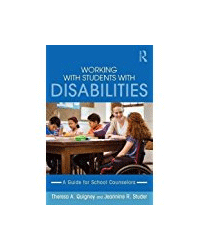“Working with Students with Disabilities: A Guide for School Counselors”

“Working with Students with Disabilities: A Guide for School Counselors.”
By Theresa A. Quigney and Jeannine R. Studer
Routledge
New York, N.Y., 2016
Book examines vital role of school counselors
Reviewed by Kerry Morrison, Psy.D.
Our public schools are obligated to educate all students including those with disabilities and to help them realize their potential and meet/or exceed their academic standards, but most school counselors do not have formal training, exposure or experience in treating the needs of students with disabilities according to the authors of “Working with Students with Disabilities.”
School counselors specifically lack experience in the process of identification of a disability, in Individual Educational Plan (IEP) development and implementation and in understanding the legislative basis for many aspects of special education.
This book is an attempt to close the gap between training, expectations and professional responsibilities of school counselors who work with students K-12 with special needs.
Theresa Quigney and Jeannine R. Studer examine the vital role school counselors can play in working with students with disabilities.
A lot of valuable information is packed into this small volume. Topics are well organized and range from educational laws and regulations, such as the Americans with Disabilities Act (2008), to types of disabilities, the leadership role of school counselor and current topics in education.
I found it especially helpful in clarifying the disability laws, as the authors’ aptly note, special education has a strong foundation in legislative tenets and legal findings based on litigation.
Better understanding of the laws and educational acts can help those who work with students, parents and school systems.
I also found valuable the information that clearly explains the differences between Section 504 Plans (the provision of accommodations or modifications by adapting materials, teaching, homework, testing and grading) and IEPs (the provision of specialized education goals, objectives, benchmarks and services by whom and when).
Psychologists who work with school-aged children, myself included, hear those terms all the time, but being able to distinguish what each of those plans specifically entails can be confusing.
Therefore, the detailed explanation of how the process works after a student has been assessed, diagnosed with a disability and met the criteria for either a Section 504 Plan or an IEP was very informative.
It’s clear after reading this book that a well-informed school counselor can be a strong and necessary advocate for children with disabilities and can be an instrumental leader in getting their educational needs met.
I would recommend this book to those who work with school-aged children in primary and secondary schools and to parents in general, but specifically those who provide services to children who have disabilities in intelligence, hearing, vision, emotional, learning and orthopedic.
Kerry Morrison, Psy.D., is a psychologist for the Department of Developmental Services in the Central/West Region of Mass., who also has a private practice, consults, teaches and provides training on a range of mental health topics.
Learn more about the book: Working with Students with Disabilities: A Guide for Professional School Counselors
